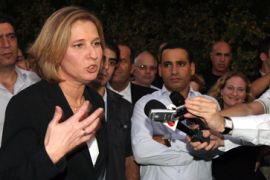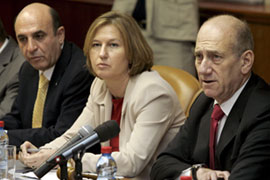Profile: Tzipi Livni
Israel’s foreign minister replaced Ehud Olmert as the ruling Kadima party head.

 |
| Livni’s efforts to form a coalition government seem to have reached a dead end [AFP] |
The most powerful woman in Israel since Golda Meir, Israel’s prime minister in the 1970s, Tzipi Livni enjoys a great deal of respect internationally as well as popularity at home.
But she has brushed off the frequent comparisons with Meir, telling a local newspaper: “I am not Golda Meir the second, but Tzipi Livni the first, and I will lead Israel in the coming period.”
Livni, married with two children, appears to have steered clear of the scandals that have dogged other Israeli ministers and has escaped domestic recrimination over Israel’s 2006 war against Hezbollah.
In May last year, after a scathing report into the 34-day conflict, she called on Ehud Olmert to resign as the prime minister and said she would seek to take over as leader of the Kadima party.
But Olmert refused to step down and Livni had to wait until September 2008, when the he was forced to resign following a bribery scandal, before she could make her stand for the party leadership.
She saw off competition from Shaul Mofaz, the transport minister and a former chief of the Israeli army, to take up the post.
Peace negotiator
Born in Tel Aviv on July 8, 1958, Livni was first elected to the Knesset (Israel’s parliament) in 1999 and later became Israel’s second woman foreign minister – the post was also held by Meir.
 |
| Livni, right, has been Israel’s chief negotiator in peace talks [AFP] |
She has been Israel’s chief negotiator in peace talks with the Palestinians, but has remained tight-lipped about the latest round of peace talks, insisting that they be conducted away from the media spotlight.
Livni comes from a well-known “ultranationalist” family – her father led the armed underground group the Irgun in the 1940s, which fought for an exclusively Jewish homeland in Palestine and opposed partitioning the territory with Arabs.
But Livni herself has endorsed withdrawal from some occupied Palestinian lands as a pragmatic way to preserve Israel’s Jewish majority – if not to achieve a peace agreement.
She defected from the Likud party in 2005 to join Olmert and Ariel Sharon, then prime minister, in forming Kadima, with the idea of unilateral withdrawal from parts of the occupied territories.
“I came to the painful realisation that if I have to choose between a Greater Israel and Israel continuing to be a Jewish and democratic country. I must choose the latter,” Livni said.
She was a key member of the team that oversaw Israel’s disengagement from Gaza.
Mossad agent
Much of Livni’s political career is seen as being a result of her relationship with Sharon, under whom she served as justice minister.
 |
| Livni joined Kadima with Olmert when it was formed in 2005 [EPA] |
Some say she had served in the Mossad foreign intelligence service as a legal adviser. Others speculate that she helped hunt Arab enemies abroad.
She also had a career as a lawyer specialising in commercial, constitutional, and real estate law.
At times outspoken, she once called Mahmoud Abbas, the Palestinian president, “irrelevant”.
As head of Kadima party she struggled to form a coalition government, without success and called for snap elections.
But opinion polls have indicated that Benjamin Netanyahu, the leader of the Likud party, could sweep to power in the event of a vote.